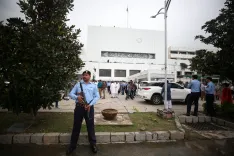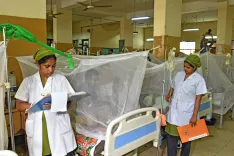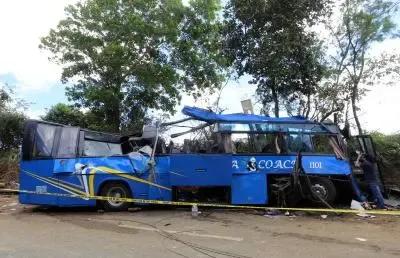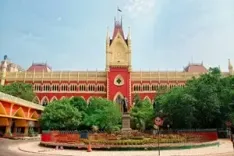What Happened in Bangladesh? One Dead as Workers Clash with Security Forces Over Factory Closures
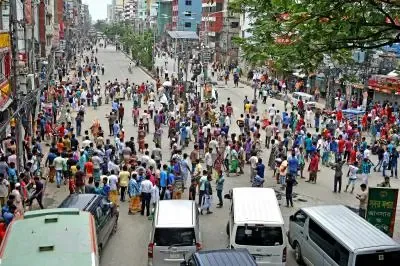
Synopsis
Key Takeaways
- One worker killed during clashes in Nilphamari.
- Ten injured amidst protests against factory closures.
- Over 500 factories have shut down in Bangladesh in the past year.
- Approximately 120,000 workers facing unemployment.
- Protests highlight serious issues in workers' rights and safety.
Dhaka, Sep 2 (NationPress) In a tragic incident, a worker lost his life and 10 others sustained injuries on Tuesday during violent confrontations between employees and law enforcement in northern Bangladesh, sparked by protests against factory shutdowns and layoffs.
The workers convened in the Export Processing Zone (EPZ) located in the Nilphamari district of the Rangpur Division, where clashes erupted with security personnel, according to local media sources.
The deceased has been identified as 20-year-old Habibur Rahman, who was employed at a knitting factory called Eku International, as reported by the prominent Bangladeshi daily, Prothom Alo.
"Habibur was completing his night shift when he was shot and killed while exiting the EPZ this morning," stated his elder brother, Ashiqur Rahman.
According to Nilphamari Sadar Police Station Officer-in-Charge (OC) MR Sayeed, "We are currently assessing the situation. There are reports of a death, but I cannot confirm the details at this moment."
Those injured were quickly taken to Nilphamari General Hospital.
Dr. Farhan Tanvirul Islam, who works in the hospital's emergency department, reported that Habibur was pronounced dead upon arrival, while six others suffering from injuries were also admitted for treatment.
It has been noted that 51 workers were recently laid off from the Evergreen factory, which ignited outrage among the workforce.
With tensions escalating, management announced an indefinite closure of the factory starting Tuesday, without resolving the workers' outstanding salaries and allowances.
Upon arriving for their shift on Tuesday morning, workers found a notice at the gate barring their entry. In response, they staged a protest on the road outside the EPZ, halting traffic on the Nilphamari-Saidpur highway.
Both army and police forces were deployed to disperse the crowd, but the agitated workers reportedly retaliated, leading to violent clashes.
The ongoing closure of multiple factories across Bangladesh has led to persistent protests, resulting in fatalities and severe injuries among workers.
According to the Awami League, over the past year, more than 500 factories nationwide have shut down, forcing nearly 120,000 workers into unemployment, many of whom returned to their villages disheartened after unsuccessful job searches.
In a recent incident, hundreds of ready-made garment (RMG) workers blocked the Dhaka–Mymensingh Highway in Gazipur district, demanding the reopening of closed factories and the immediate payment of their overdue wages.
Protests and strikes concerning unpaid wages and worsening working conditions have become widespread throughout the country since the interim government led by Muhammad Yunus took office in August 2024.

